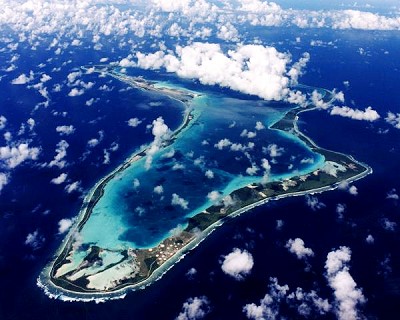The Chagos Archipelago

Previously (here) I have discussed the ecological irony that the creation of scorched no man's land areas of destruction and war around the planet have, over time, led to the counter-intuitive effect of a blossoming of wildlife. (As has Gaw here.) It would appear there are other even more contentious places than Chernobyl where this 're-naturing' effect has become evident.
Nearly 50 years ago, at the height of the Cold War, the people of
The Chagos Archipelago were forcibly removed from their Indian Ocean paradise by the UK government, and repatriated to the slums of Mauritius in order to make way for the US airforce base of Diego Garcia. A group of Chagossians and their supporters have long clamoured for the right to return back to their island way of life, but have been blocked at every opportunity by a British government eager to assuage their US overlords. This has always seemed an unfair situation, and a situation that one could easily compartmentalize in one's head as being of a cold hearted technological superpower laying waste to a simple agrarian way of life, for the purposes of power and war.
But now it turns out that a new argument has been raised to bar them from returning to the islands. Scientists have been amazed to discover that the highly secure militarized zone around Diego Garcia has become an incredible haven for wildlife in the otherwise dangerously overfished and polluted Indian Ocean. Government scientists are now saying that the Chagossians (who are not indiginous to the islands, but copra plantation workers only a few generations old) would systematically ruin this marine reserve with pollution and overfishing should they be allowed to return. How much of this is true, and how much is a cunning ruse dreamt up by the British government to keep the Chagossians from returning is unclear. Certainly the Chagossians have a powerful new opponent in the current ecological lobby. It's a strange irony that people who were seen as the protectors of their land can now be seen as the despoilers, but it remains a fact that once again it would seem that one act of industrialisation and development has inadvertantly and almost perversely led to a protection and nurturing of a pristine ecosystem.
 Subscribe by RSS
Subscribe by RSS